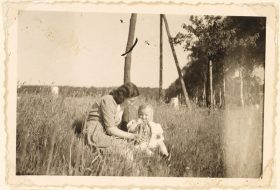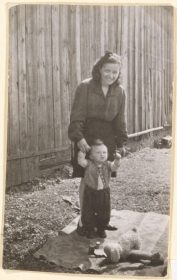The third episode in our blog series “Memories from the Life of Walter Frankenstein”
“Her and no one else,” said Walter Frankenstein the first time he saw his future wife Leonie Rosner in the courtyard of the Auerbach Jewish Orphanage. Leonie was from Leipzig and in Berlin she had begun training at the Jewish Seminar for Nursery School Teachers.

Leonie Frankenstein with her son Peter-Uri sitting in a meadow, Brzeźno in Gorzów County (German: Briesenhorst), May 1944; Jewish Museum Berlin, gift of Leonie and Walter Frankenstein
After it was closed, she came to the Auerbach Jewish Orphanage as an apprentice. Soon after her arrival, Leonie’s room quickly became the place where apprentices living in the orphanage met. Seventeen-year-old Walter grew closer to Leonie (three years his senior) over conversations about religion, Judaism, emigration to Palestine, and daily life. In fall 1941, after the director threatened to fire Leonie over her behavior toward a student, the young couple decided to leave “Auerbach”. Walter and Leonie subletted a room with the Mendel family in Prenzlauer Berg. Soon after that they decided to get married. They had heard that married couples would be spared deportation. Under-aged Walter had to get his mother’s permission for the wedding, which took place on February 10, 1942.
At this point, Walter Frankenstein earned his living as a tradesman for the Jewish Community after the Jewish Construction School was closed. As an employee of the Community, he had to perform forced labor, which once brought him to the official residence of Adolf Eichmann on Kurfürstenstraße. “One speck and you’re in Auschwitz tomorrow,” the S.S. Obersturmbannführer (lieutenant colonel) threatened Walter as he plastered over a telephone line in Eichmann’s office.
Leonie Frankenstein also had to suffer through forced labor. She became pregnant shortly after the wedding and was relegated to a factory for tethered balloons. The smell of glue in the factory was unbearable. Leonie regularly fainted at work. She asked her overseer if she could be transferred elsewhere and was placed in a factory for transformer coils. She worked there until one week before the birth of her son Uri Frankenstein on January 20, 1943. Uri was born in the Jewish Hospital and was circumcised against his parents’ wishes. Leonie and Walter feared that it would make their child identifiable as Jewish.
Beginning in 1943, the situation of Jews in Germany became ever more dangerous. The deportation of German Jews to concentration camps and death camps in the east had reached an advanced stage. One morning at the end of February 1943, it became apparent to Walter how dangerous the situation was for his family: at his place of employment at Bayrisher Platz in Schöneberg, Berlin, the only person present was an official from the Gestapo. None of his colleagues were there. He learned from the official that they had been deported the night before. When his overseer inquired as to what they should do with Walter, he fled immediately. Just a few days later, Leonie escaped an order to appear with her six-week-old son at the detention camp at Große Hamburger Straße, and the family decided that going underground was the only way to survive.

Leonie Frankenstein holds her son Peter-Uri by the hands, Brzeźno in Gorzów County (German: Briesenhorst), 1944; Jewish Museum Berlin, gift of Leonie and Walter Frankenstein
During Leonie’s second pregnancy in 1944, she registered under a false identity at a center for people displaced by bombings, and was sent to Briesenhorst as a “German mother” with Uri. She spent the spring and summer there with a farm-woman and her daughter. There are a few photos that have survived from this time depicting the Frankenstein family’s life underground. They show Leonie and Uri on the farm. Leonie’s contractions began at the end of September 1944. She had to go to a hospital in Landsberg an der Warthe (now Gorzów Wielkopolski), and after the birth of her son Michael on September 26, 1944, she had to stay there for another three weeks due to an infection. She constantly thought about the fact that Uri was circumcised and therefore clearly identifiable to the farmer as a Jewish child. However, when she returned to the farm, she found Uri well-fed and taken care of. The farmer never said a word about the origins of the boy and his mother.
Walter also had good luck on a few occasions. In 1944, after another night spent in bombed-out ruins, he was riding on the S-Bahn train. He usually always stood next to the door in case of inspections. But he was very tired, so he sat down and nodded off. He didn’t wake up until a so-called Kettenhund (a military policeman, literally “guard dog”) was demanding his papers. Walter said in a fake accent that he was a foreign forced laborer who had forgotten his identification in his work clothing. The officer suggested they get out at Friedrichstraße Station. He planned to call Walter’s supposed employer from a police precinct there and inquire about his identity. After both men got off the train, Walter saw no other option than to admit to the officer that he was a Jew living illegally in Berlin, and if the officer reported to him, to be deported to Auschwitz the next day. After considering it briefly, the Kettenhund told Walter “Get lost, I’m not looking for Jews, I’m looking for deserters.”
These stories are just two examples of how Walter, Leonie, Uri, and Michael survived their time underground. On April 27, 1945, the four Frankensteins witnessed Germany’s liberation by the Soviet Army. Their horror and fear had finally come to an end—and now an uncertain future lay before them.
Anna Rosemann believes that it is important that the Frankenstein family’s story of survival be passed on.
You can find more photographs from the life of the Frankenstein family in our online collection.
If you would like to delve more deeply into the biographies of Walter and Leonie Frankenstein, we recommend the book Nicht mit uns – Das Leben von Walter und Leonie Frankenstein by Klaus Hillenbrand, which was published in 2008 by the Jüdischer Verlag, an imprint of Suhrkamp.